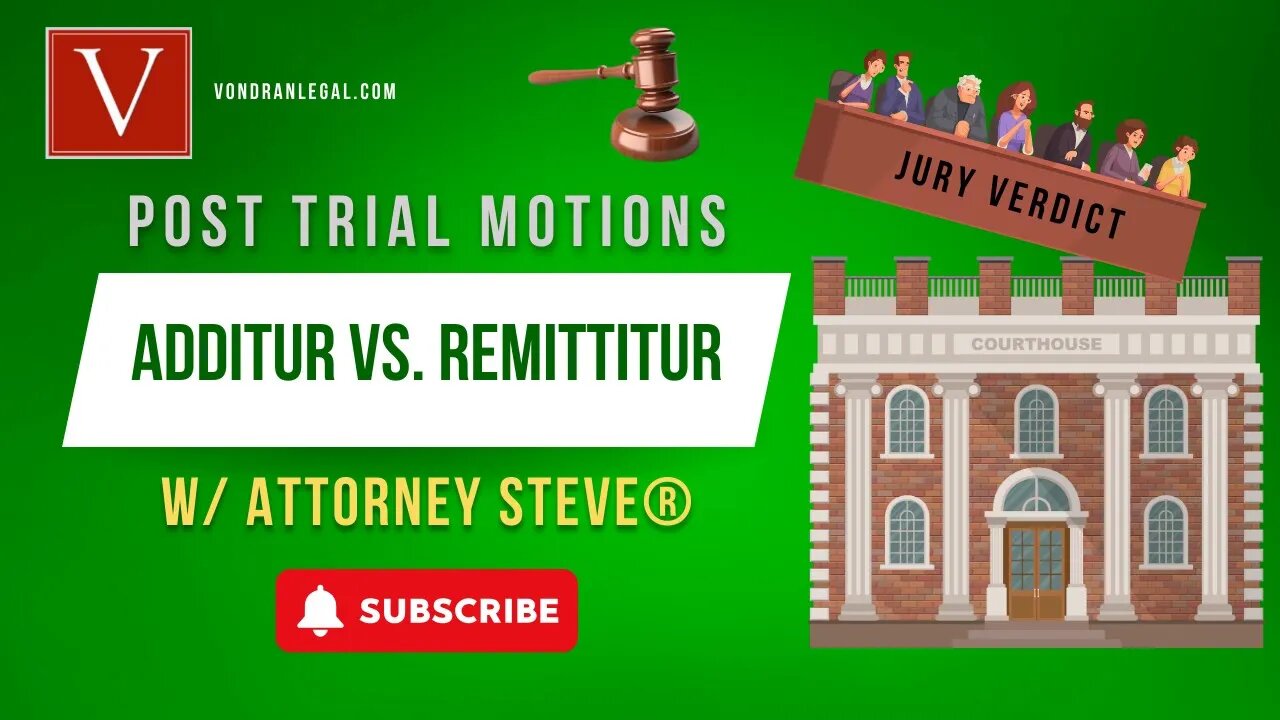Premium Only Content

Additur vs. Remittitur explained by Attorney Steve
http://www.vondranlegal.com - Vondeezy, Law Made EZ! Feel free to share this video! Thanks for watching and don't forget to SUSBCRIBE, LIKE and MAKE A COMMENT!!
WHAT IS THE DIFFERENCE BETWEEN A MOTION FOR ADDITUR VS. REMITTITUR
A motion for additur and a motion for remittitur are legal procedures related to jury awards in civil cases. They are typically used when one party believes that the jury's award is either too low (for a motion for additur) or too high (for a motion for remittitur) and seeks to have the court adjust the amount of damages awarded. Here's the difference between the two:
Motion for Additur:
Additur is a legal remedy used when a party believes that the jury's award is insufficient, and they want the court to increase the amount of damages. In this scenario, the party who is dissatisfied with the jury's verdict requests the court to add an additional amount to the jury's award. The judge has the authority to grant or deny the motion for additur. If granted, the judge will increase the amount of damages awarded by the jury.
Motion for Remittitur:
Remittitur is the opposite of additur and is used when a party believes that the jury's award is excessive or that the jury made an improper verdict. In this case, the dissatisfied party seeks to have the court reduce the amount of damages awarded by the jury. Similar to additur, it's up to the judge to decide whether to grant or deny the motion for remittitur. If granted, the judge will reduce the amount of damages awarded by the jury.
These motions are typically used when there is a clear and significant disparity between the jury's award and the evidence presented during the trial. The party making the motion must present a persuasive argument to convince the judge that an adjustment is necessary.
It's important to note that the availability and procedures for additur and remittitur can vary by jurisdiction, and not all legal systems allow for these motions. Additionally, the judge's decision to grant or deny such a motion is generally discretionary and based on the specific facts and circumstances of the case.
If the case is in federal court (ex. a copyright, trademark, or trade secret case), look to FRCP Rule 59 which permits a motion to amend or alter a judgment.
-
 LIVE
LIVE
The Quartering
20 hours agoYule Log Christmas MAGA Edition With Memes! Come Hang Out!
1,859 watching -
 38:41
38:41
MYLUNCHBREAK CHANNEL PAGE
1 day agoTimeline Begins in 1800? - Pt 1 & 2
18.8K15 -
 1:23:41
1:23:41
Game On!
20 hours ago $7.58 earnedNetflix NFL Christmas Games Preview and Predictions!
41.5K9 -
 2:05:07
2:05:07
Darkhorse Podcast
1 day agoWhy Trump Wants Greenland: The 257th Evolutionary Lens with Bret Weinstein and Heather Heying
277K441 -
 8:50:58
8:50:58
Right Side Broadcasting Network
1 day ago🎅 LIVE: Tracking Santa on Christmas Eve 2024 NORAD Santa Tracker 🎅
302K43 -
 2:48
2:48
Steven Crowder
1 day agoCROWDER CLASSICS: What’s This? | Nightmare Before Kwanzaa (Nightmare Before Christmas Parody)
292K12 -
 33:49
33:49
Quite Frankly
23 hours agoThe Christmas Eve Midnight Telethon
102K22 -
 2:12:46
2:12:46
Price of Reason
23 hours agoAmber Heard BACKS Blake Lively Lawsuit Against Justin Baldoni! Is Disney CEO Bob Iger in TROUBLE?
56.9K23 -
 1:01:17
1:01:17
The StoneZONE with Roger Stone
17 hours agoChristmas Edition: Why the Panama Canal is Part of the America First Agenda | The StoneZONE
127K47 -
 18:12:15
18:12:15
LFA TV
1 day agoLFA TV CHRISTMAS EVE REPLAY
142K18